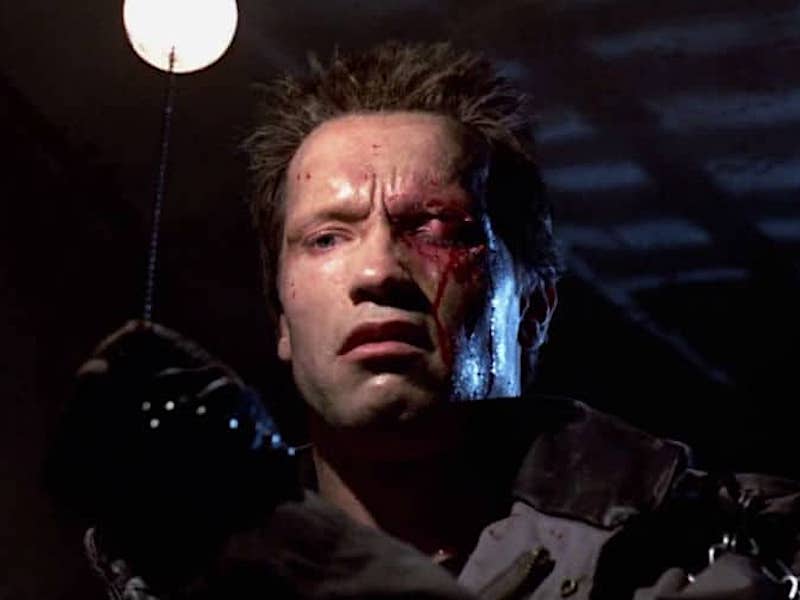
Film criticism has a recency bias. Look no further than a site like RottenTomatoes; even if you ignore the standard arguments about the site’s binary output, most of the reviews referenced on the site date back a decade or two. Those few reviews dated pre-2000 are often tied to the output of an individual critic (Roger Ebert probably) or connected to a newspaper that has the resources to create a digital archive.
Back in the heyday of American newspapers, countless trips to the multiplex were informed by a paper’s local critic, someone who — either by aptitude or availability — had been named to the film beat. These reviews are fascinating historical objects, shining a light on both the audiences of these publications and the public perception of films and their stars. With Alita: Battle Angel in theaters this weekend and James Cameron dominating headlines as only he can, this week we look at some of the original reviews for The Terminator to see how contemporary critics accepted the madcap adventures of a time-traveling robot.
The Terminator landed in more than a thousand theaters on October 26, 1984, and quickly shot to the top of the box office. While Cameron’s classic has long-since earned its place as a landmark science fiction film, the initial reviews were also fairly favorable; if we were to apply the T-Meter specifications to that day and age, a cross-section of 26 reviews — ranging from Oregon newspapers to publications like The New York Times — places the film at a respectable 69%.
For many critics, the most significant talking point in the film — literally and metaphorically — was the performance of Arnold Schwarzenegger as the cyborg killer. By 1984, Schwarzenegger had a small selection of acting credits to his name, none as influential as his two Conan the Barbarian films. This background made him something of a polarizing choice for the movie. Some, like The Philadelphia Inquirer’s Desmond Ryan, felt that The Terminator served as the final word on Schwarzenneger’s acting career. “Protected by the impenetrable thickness of his accent,” Ryan wrote, “Schwarzenneger cannot be stopped by bullets … it is the kind of nonsense that cries out for the summary termination of his career in movies.”
Similarly, Bill O’Connor of the Akron Beacon Journal spent a total of eight paragraphs dissecting Schwarzenegger’s star power — including a curious departure on his appeal within the gay community — before he offered a single word of analysis of the film. When he finally circled back to Schwarzenegger as a performer, he was less than charitable. “It is a monument to Schwarzenegger’s acting,” O’Connor wrote, “that the metal wires [of the T-800 model] are more eloquent than him.”
Others saw things differently. For these writers, not only did Schwarzenegger’s lack of dialogue work in his favor — the half-serious guesses at his number of actual lines range from eight to a dozen to 16-plus — they also allowed audiences to focus on his gifts as a physical performer. In her review, Heather McClenaghan of the Corvallis Gazette-Times rightly called out the scene where Schwarzenegger’s machine first put on sunglasses as a defining moment in the actor’s career. “In shades,” she wrote, ”Arnie is Clint Eastwood on steroids.” To her credit, Deborah Jerome of The Record was one of the few writers to recognize just how funny Schwarzenegger’s performance truly was. “It’s a comic-scary part, this machine he plays,” she explained, “and he gives it his all.”
But even if most did not credit Schwarzenegger with an abundance of comic timing, there were a few writers who pointed to a blend of action and humor that would become a signature element of both the director and performer’s careers. The Chicago Tribune’s Sid Smith, when pointing out the odd balance of violence and jokes, admitted that this tonal imbalance worked despite itself. “An often deadly combination,” he wrote, “here the schizoid style helps, providing a little humor just when the sci-fi plot turns too sluggish or the dialogue too hokey.” Several reviews even made a note of Cameron’s connection to genre movie magnate Roger Corman, evaluating The Terminator through the lens of B-grade cinema. St. Petersberg Times critic Thomas French, who charmingly referred to The Terminator as a “pulsing trash epic,” also recognized those little touches, arguing that “Cameron has given his picture one of the better collections of throwaway lines and B movie moments.”
Of course, film critics did collectively miss the boat on the enduring significance of Cameron’s movie and its potential as one of Hollywood’s most lucrative franchises. Even the film’s more favorable reviews regarded it as nothing more than disposable fun. “Corman would be proud,” wrote Mike McInally of The Missoulian, “and, in fact, the film — in spots — looks like one of Corman’s seedy gems.” Malcolm L. Johnson of the Hartford Courant had plenty of good things to say about Cameron’s direction and the performances of Schwarzenegger, Michael Biehn, and Linda Hamilton, but even he could not find it in himself to call The Terminator much more than “a far better than average B-level [science fiction] film saga.” Henry Edgar in the Daily Press was even more succinct: “The Terminator may not be great art,” he wrote, “but it’s a great thriller.” He was half-right.
It could be worse, though. Only one critic — Ed Blank of The Pittsburgh Press – used Cameron’s film as a reason to dismiss three of the most influential genre films of the decade in one sweeping pronouncement. “The Terminator is just another of the films drenched in artsy ugliness,” he wrote, “like Streets of Fire and Blade Runner.” There’s one he’d probably like to have back.
Related Topics: Arnold Schwarzenegger, James Cameron, The Terminator, What Critics Said

